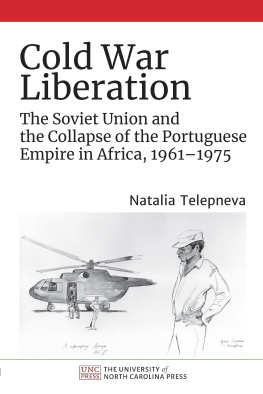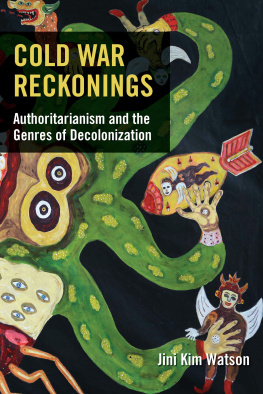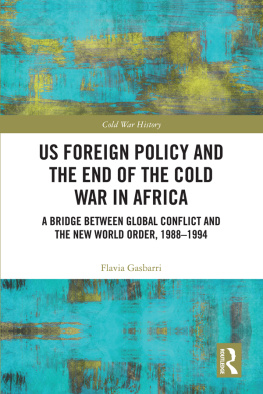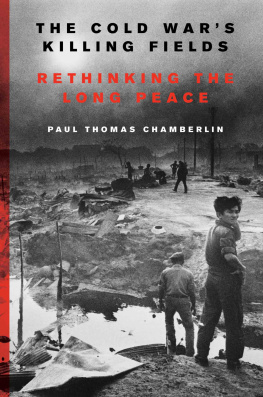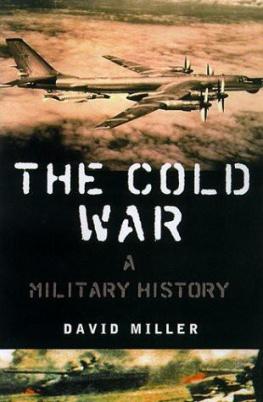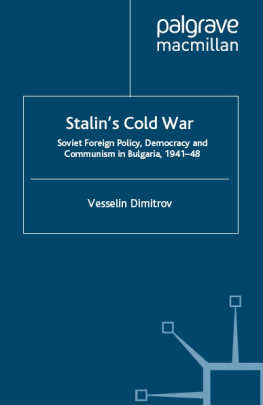Neocolonial Fictions of the Global Cold War
THE NEW AMERICAN CANON: THE IOWA SERIES IN CONTEMPORARY LITERATURE AND CULTURE
Samuel Cohen, series editor
NEOCOLONIAL FICTIONS OF THE GLOBAL COLD WAR
edited by Steven Belletto and Joseph Keith
UNIVERSITY OF IOWA PRESS,
IOWA CITY 52242
Copyright 2019 by the University of Iowa Press
www.uipress.uiowa.edu
Printed in the United States of America
Design by Ashley Muehlbauer
No part of this book may be reproduced or used in any form or by any means without permission in writing from the publisher. All reasonable steps have been taken to contact copyright holders of material used in this book. The publisher would be pleased to make suitable arrangements with any whom it has not been possible to reach.
The University of Iowa Press is a member of Green Press
Initiative and is committed to preserving natural resources.
Printed on acid-free paper
Library of Congress Cataloging-in-Publication Data
Names: Belletto, Steven, editor. | Keith, Joseph, editor.
Title: Neocolonial fictions of the global Cold War / edited by Steven Belletto and Joseph Keith.
Description: Iowa City : University of Iowa Press, [2019] | Series: The New American canon | Includes bibliographical references. | Identifiers: LCCN 2018034316 (print) |
LCCN 2018056287 (ebook) | ISBN 978-1-60938-632-0 (ebook) | ISBN 978-1-60938-631-3 (pbk. : alk. paper)
Subjects: LCSH: American literature20th centuryHistory and criticism. | Cold War in literature. | Literature and transnationalismUnited States.
Classification: LCC PS228.C58 (ebook) |
LCC PS228.C58 N46 2018 (print) | DDC 810.9/3582825dc23
LC record available at https://lccn.loc.gov/2018034316
Chapter one, The Korean War, the Cold War, and the American Novel by Steven Belletto, was originally published in American Literature. 87, 1:5177. Copyright 2015, Duke University Press. All rights reserved. Republished by permission of the publisher.
Chapter four, American Spectacle and the Vietnam War Sublime by William V. Spanos and Adam V. Spanos, was originally published as The Nothingness of Being and the Spectacle: The American Sublime Revisited, in Redeemer Nation in the Interregnum: An Untimely Mediation on the American Vocation (New York: Fordham University Press, 2016), 141.
To William V. Spanos, 19242017
CONTENTS
Steven Belletto and Joseph Keith
1. The Korean War, the Cold War, and the American Novel
Steven Belletto
Cedric Tolliver
Michele Hardesty
William V. Spanos and Adam V. Spanos
Kate Baldwin
Crystal Parikh
Cheryl Higashida
Donald E. Pease
John Carlos Rowe
Adam Piette
Andrew Hoberek
ACKNOWLEDGMENTS
We would like to thank Ranjit Arab, senior acquisitions editor at the University of Iowa Press, and Sam Cohen, editor of the New American Canon series, for their enthusiasm and support for this project. The entire production staff at Iowa has been a pleasure to work with. We would also like to thank our contributors once again for producing such fine work, and for their patience as we brought this volume to fruition.
Neocolonial Fictions of the Global Cold War
INTRODUCTION
Neocolonialism and Literature
STEVEN BELLETTO AND JOSEPH KEITH
In 1965, Ghanaian president Kwame Nkrumah published Neo-Colonialism: The Last Stage of Imperialism, putting a finer point on his earlier books such as Towards Colonial Freedom (1962) and Africa Must Unite (1963). In Neo-Colonialism, Nkrumah was interested in the elasticity of that term, and how it might be used as a window into the economic exploitation of smaller states by larger powers following the collapse of the old colonial system. The essence of neo-colonialism, he explains in the books introduction, is that the State which is subject to it is, in theory, independent and has all the outward trappings of international sovereignty. In reality its economic system and thus its political policy is directed from the outside.
We turnor perhaps returnto the concept of neocolonialism because it provides an important analytic that is both historically specific and more generalizable in terms of understanding First Worldin particular USrelations with the Third or decolonizing world in the years after WWII. Indeed, with liberation struggles and the costs of the war having undermined the system of territorial colonialism historically employed by European powers, neocolonialism emerged, in the latter half of the twentieth century, as the governing form of international hegemony, superseding colonial methods of direct administrative rule with political and, in particular, financial forms of domination masked beneath a legitimizing logic or fiction of liberation. As such, neocolonialism provides a generative conceptual framework with which to understand the continuitiesand discontinuitiesbetween formal colonialism and the generally subtler tactics of US postwar hegemony that emerged within and were profoundly shaped by the global Cold War.
George Lipsitz has persuasively argued that the Cold War represents not just a historical process and event but also a way of knowing and way of being, with its own logics and optics that encouraged us to see some things and prevented us from seeing others. In turn, this collection proposes that the concept of neocolonialism provides a significant though neglected theoretical and historical framework through which to recast and reapproach US Cold War literatureboth as an understudied thematic and as an analytic for reading the political unconscious of a wide range of literary works and cultural artifacts from the period.
Neocolonialism proved, in many respects, an ideal arrangement for the West within the ideological terms of the Cold War, which in the West was figured as a struggle of democratic freedom and free-market capitalism against Soviet or Chinese-style totalitarianism and its artificial suppression of the free market. Western powers could claim to serve the interests of freedom and democracy in the Third World while instituting predatory economic and financial policies that had little regard for the local independent governments, even when democratically elected, and even less regard for the well-being of local populations. The United States in particular positioned itself in opposition not only to Communist totalitarianism but also European colonialism, claiming it was the foremost champion of independence and democracy around the world. In other words, the United States legitimated its ascendance to the dominant international power by redeploying a long-standing and central ideology of American exceptionalism: the idea that the United States was in a distinctive position to lead the world and to promote the general interests of humanity and freedom, not only because it was anti-Communist but because it was innocent of Old World legacies of empire and colonialism.
But where the United States financially invested or offered aid to newly independent nations under an anticolonial and anti-Communist banner
In this regard, the basic concept of neocolonialism is a way to account for the fact that the United States was not a colonial master according to the old European model, and yet during the Cold War was still responsible for a startling number of global interventions. As we now know, such interventions compromised the rule of democratically elected governments if they were perceived as hostile to US business interests in the region: in Iran in 1953, to take a well-known example, US and British operatives succeeded in fomenting a coup dtat ousting the democratically elected prime minister Mohammed Mossadegh when he proposed the British-owned Anglo-Iranian Oil Company enter into a 50/50 profit sharing plan with the Iranian people. Likewise, in 1954, Guatemalas democratically elected leader Jacobo rbenz was ousted by a CIA-engineered coup when he nationalized the vast banana plantations owned by US-based United Fruit Company. Or we might look no further than the case of Nkrumah himself, whose own democratically elected government in Ghana was deposed in 1966, less than a year after he published his tragically prescient analysis (while there is no definitive confirmation, a growing body of historical evidence suggests at the very least the CIAs tacit approval of the overthrow).territories, since the former colonial power has in theory relinquished political control, if the social conditions occasioned by neo-colonialism cause a revolt the local neo-colonial government can be sacrificed and another equally subservient one substituted in its place (xiv).
Next page

